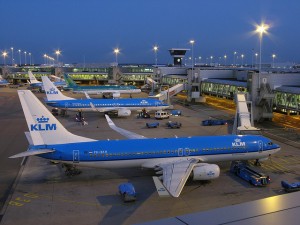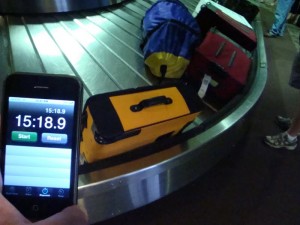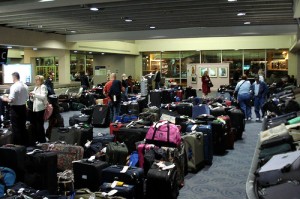
Aircraft lined at up Schophol Airport (AMS) in Amsterdam
Amsterdam’s Schiphol Airport (AMS) is the 5th largest airport in Europe and the 15th largest in the world. Already the airport is busy and they only expect it get busier. The problem is there isn’t a whole lot more room to expand the airport and one of the biggest challenges is handling all the luggage. Since they can’t grow bigger, they have had to grown smarter. The airport has been working with IBM to create a futuristic way to handle bags.
The system is housed at the new South Baggage Hall where they hope to increase bag capacity by 40% before 2018. The new system is important, ’œto create an efficient, reliable and fast baggage handling process,’ said Mark Lakerveld, Senior Manager Baggage at Amsterdam Schiphol Airport.
No matter where your bag might be in the 13 miles of conveyor system or 4,000 bag positions, the new system can track exactly where it is at. The new baggage operation has 36 cranes and 60% will be handled by robots (yes, robots). After you check in, your bag will be placed into the bag storage. Then a robot will take your bag when needed and place it on the conveyor belt, reducing overload in the system. The new luggage process is connected to real-time flight information, meaning your bag will only be pulled when your plane is ready for it.
Is this the future of airport baggage systems? Possibly. When asked if we might be seeing this system at other airports, IBM spokesperson stated, “There are a couple of similar efforts that are happening internationally that can’t be named specifically. This example is indicative of what is beginning to happen and we will see more of in airports across the world — focusing on being smarter about how they utilize the space that they have.”
Although great on paper, let’s how this is not a repeat of Denver International Airport (DEN) attempted at a similar high-tech airport luggage system in the early 1990s. Let’s hope that Schiphol has a little better luck.
Check out this video from IBM on how the system works.

Photo taken when I put Alaska's guarantee to the test!
Airline fees are not very unique anymore. It takes a bit more than a fee change or new fee to motivate me enough to write a blog on it (like charging for carry-ons). Why does Alaska Airlines and Horizon Air get a blog on fees?
Not because they are raising some fees (1st checked bag from $15 to $20) or that they are lowering others (2nd checked back from $25 to $20, 3rd from $50 to $20), but because they are making their from plane-to-you bag guarantee even better.
Previously if you checked a bag with Alaska or Horizon, they guaranteed your bag would reach the baggage carousel 25 minutes or less from the time your airplane made it to the jetway. Now that they are raising the prices for some passengers, they are improving the guarantee to only 20 minutes.
If your bag doesn’t make it in 20minutes, you can either get $20 off your next flight or 2000 miles (I vote take the miles). A while back I put their guarantee to the test on a flight from Seattle to Phoenix and my bag made it in just over 15 minutes.
Yea, fees are annoying, but they aren’t going away. At least one airline gives you something extra with your baggage fees!
connect | web | twitter | facebook |

Baggage Claim at PHL
The European Union (EU) is pushing to create tougher regulation over airlines and airports that damage and lose luggage.
Recently, United Airlines felt the brunt of a passenger who had his guitar broken during a flight. He was unhappy with how the airline treated him and if you agree or disagree, his video went viral and got a positive reaction from United.
Of course this strategy cannot work for everyone. The EU Commission is proposing that each EU country create an agency to monitor incidents of lost and damaged bags. An EU Commission survey shows that between November 2008 and March 2009, airlines on average lost one bag for every 64 passengers. ’œIt’s a serious problem,’ European Transport Commissioner Antonio Tajani said, ’œWe have to act.’
With airlines charging more for checked bag fees, it is frustrating that so many bags in the EU would be lost and damaged. Even though having less baggage lost would of course be better, is it worth all the extra money it would cost to have the government watch over the industry?
Image: Casteel

Work in progress: The tunnel has been dug underneath the airfield of Terminal 5
As part of Heathrow’s £900m (roughly $1.5 billion) overhaul of their luggage system, The British Airports Authority (BAA) is building a massive underground tunnel to transport bags between two terminals. The tunnel will run for over a mile, evading subway lines and underground fuel tanks.
Currently luggage transfer between Terminals 3 and 5 can take over an hour ’“ the new tunnel will save about 20 minutes.
You may remember Heathrow had major luggage problems last year with the opening of Terminal 5, but this very public upset did not prompt the tunnel plans, supposedly, nor will it entirely prevent lost luggage in the future. A BAA spokesperson said, ’œThere are so many different reasons why bags can go missing’¦. Baggage is a very complex world.’
Construction is happening 24 hours a day, with the hope of opening the tunnel by the end of 2011.
I don’t know, but spending multi-million dollars to shave an hour-long baggage wait down to 40 minutes seems a bit wasteful to me, especially in these harsh economic times. And people don’t even get to go down into the tunnel which seems like the coolest part!
Source: The Guardian Image: MailOnline



